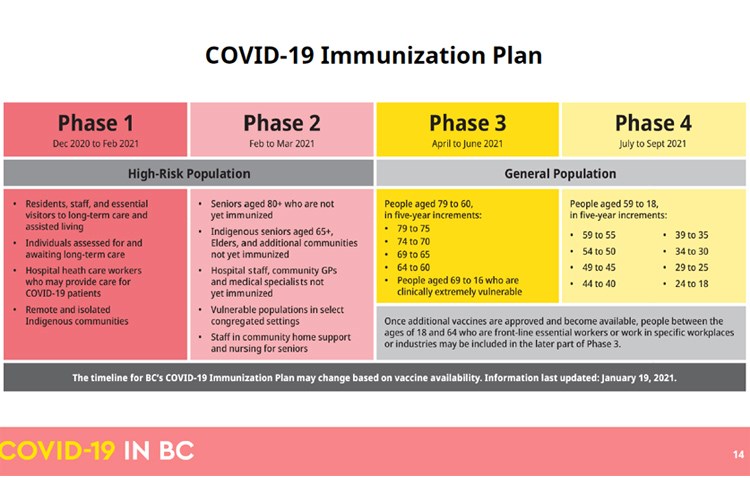Northern Health and Immunize BC aim to vaccinate 5,600 northerners a day against COVID-19, starting in April.
On Friday, the province provided a public update on its plans to vaccinate 4.3 million British Columbian adults by the end of September. There are 229,110 people aged 18 and up who will be eligible to be vaccinated in the next eight months, according to technical briefing material released by the province.
As of Thursday, more than 100,000 doses of vaccine had been administered province wide, including more than 5,000 in the Northern Health region, according to data released by the B.C. Centre for Disease Control.
"We know it will take a few months, but we have an end in sight," provincial health officer Dr. Bonnie Henry said. "We have made it this far, we have shown we can do this."
The province estimates that the equivalent of 715 full-time people will be needed to administer vaccines in order to meet its September target. That includes the equivalent of 40 full-time immunizers, plus support staff, in the Northern Health region.
The province's plans are based entirely on the Pfizer and Moderna vaccines, the two currently approved for use in Canada, Henry said. If new vaccines become available, they will be used to accelerate the province's plan.
The province is currently in Phase 1 of its plan – focused on long-term care residents and workers, front-line healthcare workers and remote, rural Indigenous communities.
Phase 2 is expected to start sometime in February and run until the end of March.
In Phase 2, all seniors 80 years old and older will be eligible to be vaccinated, along with Indigenous seniors aged 65 and up, any healthcare workers not yet vaccinated – including staff in community home support for seniors – and vulnerable populations like the homeless.
"The single greatest risk factor for COVID-19 is increasing age," Henry said.
Because of that, the best way to reduce serious illness and death from COVID-19 is to immunize the oldest residents first, she said.
Phase 3 is set to begin in April and run until June, and will begin the vaccination of the general population, starting with people aged 75 to 79, and working forward in five-year age groups.
Those in the 75 to 79 age group and 70 to 74 age groups can expect to get their first dose in April, and second vaccine dose in May.
Those aged 65 to 69 should be eligible for their first dose in May or June, and second dose in June or July. Those in the 60 to 64 year old bracket should be eligible to be vaccinated in June, with a second dose in July.
In addition, Phase 3 will see those people between the ages of 16 and 69 who are extremely vulnerable because of health conditions like cancer, cystic fibrosis, severe asthmas, organ transplant recipients or other serious conditions will also be eligible to be vaccinated.
Phase 4 will run from July to September, and will cover the rest of the adult population in five year age groups. The 55 to 59, 50 to 54, 45 to 49 and 40 to 44 age groups are scheduled to receive their first doses in July, with second doses in August.
The 35 to 39 group will be eligible for their first doses in July or August, with second doses in August or September.
The 30 to 34 and 25 to 29 age groups will be eligible in August for their first dose, with second doses in September.
Then finally the 18 to 24 year old group will be eligible for their first dose in September, with some not getting their second dose until October.
Vaccination clinics will be set up in roughly 172 locations across the province, starting in March, Henry said. Large clinics will be established in locations like convention centres and arenas in urban centres.
In addition, mobile clinics will go out to smaller, remote communities. But mobile clinics will also be used to do home visits for those who can't come out to clinics, and reach populations like those living in shelters who can't always go to a clinic to be vaccinated.
Dr. Penny Ballem, who is leading the province's vaccination campaign, said people will be able to pre-register online or by phone for a vaccination appointment two to four weeks before they are eligible to be vaccinated.
If a person doesn't get vaccinated during their age group's designated time, they can be vaccinated later, she said.
The province and health authorities will be engaging in major communication campaigns to ensure residents know when they are able to register for a vaccination appointment, Ballem said. More specific details about where clinics will be located and how residents can register will be coming in the next few months.
However, all the timelines will depend heavily on the availability of vaccines. If new vaccines come online later this year, or more supply is available, additional vulnerable groups like essential workers could be added to the Phase 3 priority list, Ballem said.
As for when British Columbians can expect life to get back to normal, Henry said residents should hold off on making travel plans anytime soon.
"We know it doesn't transmit as easily in the spring and summer months as it does in the fall and winter. So we may have some leeway there," Henry said. "I would love to be able to say July 1, but there is a whole lot of unknowns. (But) by summer, we should be able to have some parts of our normal lives again."



.png;w=120;h=80;mode=crop)